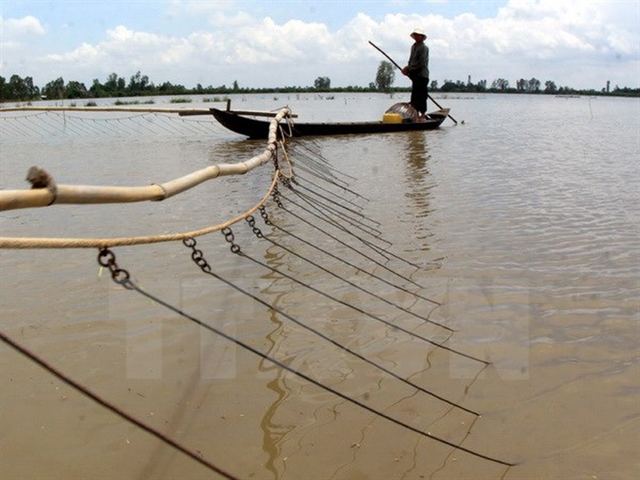 Environment
Environment

Provincial authorities in the Mekong Delta have asked Vietnamese officials to address the inter-Governmental Mekong River Commission and step up diplomatic efforts to deal with countries upstream that are threatening the flow of the giant water resource.

|
| A Vietnamese farmer set up cages to catch fish from the Mekong River in flooding season. — VNA/VNS File Photo |
ĐẮK NÔNG — Provincial authorities in the Mekong Delta have asked Vietnamese officials to address the inter-Governmental Mekong River Commission and step up diplomatic efforts to deal with countries upstream that are threatening the flow of the giant water resource.
Following widespread concerns over the many dams and flow diversions being implemented by countries situated upstream that could threaten populations living downstream on one of the world’s productive rivers, Phạm Tuấn Anh, deputy chairman of Tiền Giang Province People’s Committee, made the request as the Việt Nam National Mekong Committee convened in Đắk Nông on Tuesday.
“The committee must draw up diplomatic measures to deal with countries situated in the lower Mekong River with the aim of minimising adverse impacts on people living in downstream area,” Tuấn Anh told the commission, which was set up to work with Cambodia, Laos, Thailand and Việt Nam governments to address issues related to water resources and the sustainable development of the Mekong River region.
After hearing the reports from the Việt Nam National Mekong Committee, official representatives of localities in Việt Nam's Mekong basin have expressed serious concerns over the many projects that other Mekong nations are implementing or planning that might hamper the river's flow and the much-needed alluvia that the floodwater brings, and asked the committee to bring the country's concerns to the regional commission to best avoid the negative impacts.
Lê Đức Trung, chief of staff of the Việt Nam National Mekong River Committee, said the Mekong Delta and Central Highlands were facing abnormal weather that could be attributed to climate change.
The Mekong River level in June and July significantly decreased compared to previous years, raising worries of exacerbated drought and saline intrusion for the entire Mekong Delta in the 2019-20 dry season.
In the Central Highlands, rainfall in the dry season has dropped considerably compared to previous years while the temperatures have been 0.5-1 degrees Celsius higher than the average, sparking serious droughts that threaten vast tracts of natural forests as well as local people’s crops.
Lê Công Thành, deputy minister of Natural Resources and Environment, said that aside from natural aberrances, Việt Nam was also dealing with the human factor, specifically the increased use of water in upstream regions.
“For example, the Lao National Mekong River Committee recently sent a notice to the Mekong River Commission announcing the Luang Prabang hydropower project [situated 2,036km from the Mekong Delta in Việt Nam], which is Laos’ fifth hydropower project on the main Mekong,” Thành said. The committee had also received a notification about the under-consideration 660MW Sanakham hydropower project which contained little information.
The increasing number of proposed hydropower plants on the Mekong River in Lao territory, together with China’s dams and large-scale water diversions in northeastern Thailand for irrigation and power production, were “posing really heavy challenges on the Mekong River basin, especially on the Mekong Delta,” the environment official said.
Thành asked the national committee to look carefully at the main challenges facing top local authorities and State agencies.
Just a day earlier, during a meeting between Việt Nam and Laos' environment ministries in Đà Nẵng City, the Vietnamese side has proposed that the two neighbour countries should increase information sharing and data exchange concerning rivers running through the two countries and enhance joint efforts in trans-border water resources management.
The Vietnamese side has also proposed "closer coordination in information exchange on hydropower dams planned on the Mekong mainstream with Việt Nam National Mekong River Committee."
Delegates at the meeting also asked the committee to update provincial authorities on developments in the basin, especially the exploitation of water resources by other countries on the river, so they could respond accordingly.
Thành said all “alterations” to the Mekong River stemmed from countries’ socio-economic needs, therefore more consultation between Mekong countries was needed. — VNS




